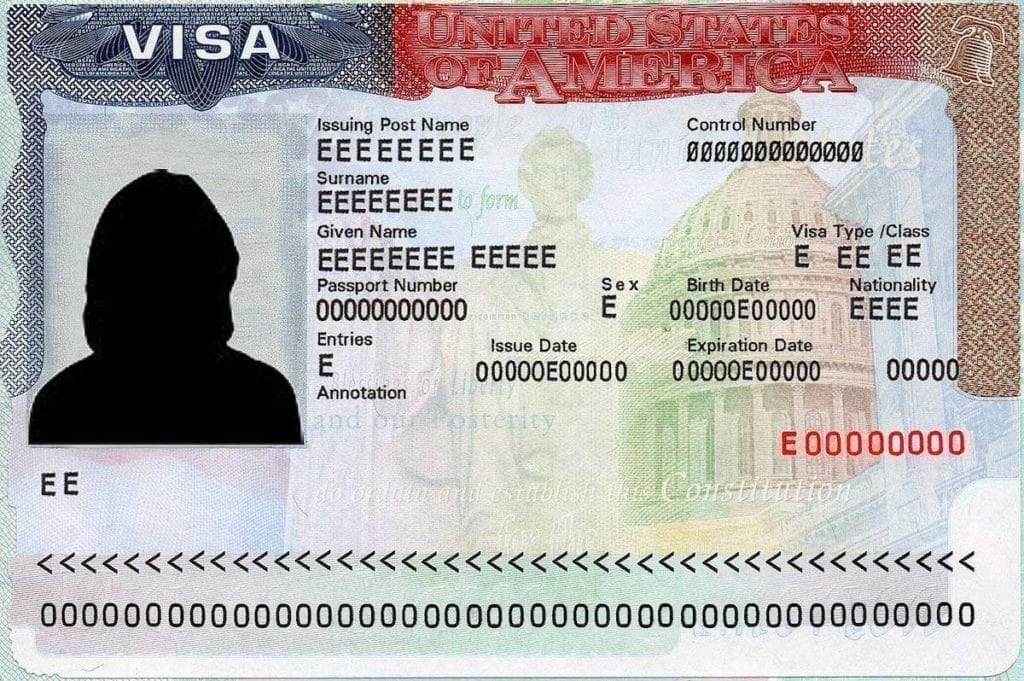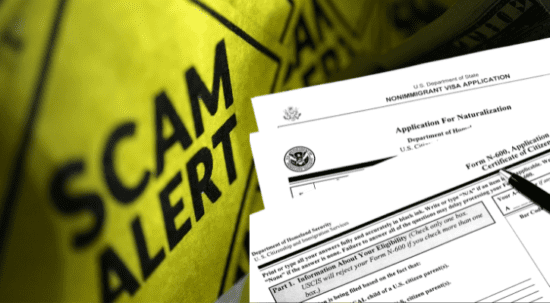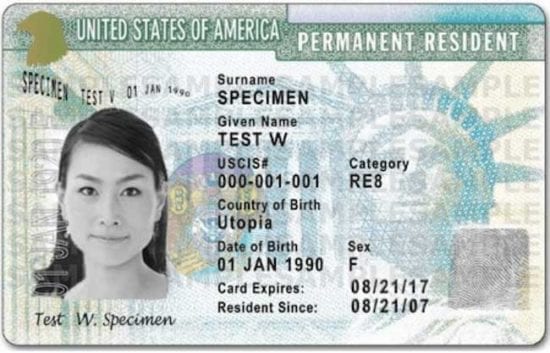What is a visa?
A visa is an official document that allows people to travel to the United States for a specific purpose. A visa is stamped or placed into someone’s passport or travel document. A visa indicates the number of times a traveler can enter the United States.

Do I need a visa?
Not all people traveling to the U.S. require a visa. The Visa Waiver Program (VWP) allows citizens of 40 countries to travel without one. You must meet the following requirements:
- Be a citizen or national of the countries listed here
- Have a passport that is valid for at least 6 months from the date you plan to travel to the U.S.
- Have a valid Electronic System for Travel Authorization (ESTA)
- Be traveling for business or tourism
- Plan to stay in the U.S. for 90 days or less
What are the types of U.S. visas?
There are two categories of visas:
- Nonimmigrant visas are for people visiting the U.S. temporarily.
- Immigrant visas are for people moving to the U.S. permanently. When a person with an immigrant visa enters the U.S., they become an “LPR” or legal permanent resident.
Nonimmigrant visas
The majority of nonimmigrant visas are issued to international travelers for business and tourism, students, temporary workers, and exchange visitors.
If you are issued a nonimmigrant visa, you will also have to pay a $250 visa integrity fee.
Visa |
Type |
For |
Requirements |
Form(s) |
Fees |
|---|---|---|---|---|---|
B-1, B-2 |
Business, pleasure, tourism, or medical treatment for a short period of time |
Prove you have funds to cover all costs of your trip and that you intend to return home at the end of your stay in the U.S. |
$185 |
||
F, M |
Academic or vocational program for international students |
Prove acceptance into an academic or vocational program |
$185 |
||
H-1B, H-1B1, H-2A, H-2B, H-3, L, O, P-1, P-2, P-3, Q-1 |
Employment for a short period of time |
Approved Form I-129 petition |
$205 (Plus I-129 Filing Fees) |
||
T, U |
Victims of human trafficking and other crimes |
Be willing to help U.S. law enforcement investigate or prosecute crimes that you were a victim of in the U.S. |
$185 |
||
K-3 |
Spouses of U.S. citizens to enter the U.S. while they wait for an immigrant visa petition to be approved |
Approved Form I-129F petition; proof that your marriage is genuine and has financial support |
$265 |
||
K-1 |
Fiances of U.S. citizens to travel to the U.S. to marry |
Approved Form I-129F petition; evidence of relationship |
$265 (Plus I-129F Filing Fees) |
||
G, NATO |
Diplomats, government officials, and employees who work for international organizations or NATO |
Diplomatic note or travel order |
$0 |
Immigrant visas
Most immigrant visas are issued to family members of U.S. citizens and Green Card holders, followed by people coming to the U.S. for work.
Visa |
Type |
For |
Requirements |
Form(s) |
Fees |
|---|---|---|---|---|---|
IR1, CR1, IR3, IH3, IR4, IH4, IR2, CR2, IR5, F1, F3, F4, F2A, F2B |
– Spouse or child (of any age, married or unmarried) of a U.S. citizen – Parent or sibling of a U.S. citizen 21 or older – Spouse or unmarried child of a U.S. LPR |
Approved Form I-130 petition, Affidavit of support (Form I-864) |
$325 $120 Affidavit of Support Plus I-130 Filing Fees |
||
E1, E2, E3, EW3, E4, E5, Ew3, C5, T5, R5, I5, SD, SR |
Priority workers, professionals holding advanced degrees, skilled workers, professionals, and unskilled workers, religious workers |
DOL certification approval, approved Form I-140 petition, proof of job offer, proof of financial support |
$345 |
||
SIV |
Afghans who were employed by or on behalf of the U.S. government or who worked with the U.S. military as a translator or interpreter |
Proof of employment for at least 12 months, recommendation letter from employer |
$0 |
||
DV |
People from countries designated for diversity visas |
Proof of high school education or two years of work experience |
$330 |
||
SB-1 |
Permanent or conditional residents who have left the U.S. for more than one year |
Permanent resident card, reentry permit |
$180 |
Find a complete list of immigrant and nonimmigrant visas.
Additional visa restrictions
- If you are from Palestine, the U.S. has stopped issuing all visitor visas, including for personal, academic, business, and medical reasons.
- If you are from South Sudan, your U.S. visa may be revoked, and your visa application may not be processed. You should receive a notice if this applies to you.
- If you are from a travel ban country, you may not be allowed to enter the U.S., and your visa application or travel plans could be delayed, denied, or reviewed again under new rules.
- If you are from one of 75 countries, the U.S. government has paused immigrant visa processing. Immigrant visa applications are not being decided right now while officials apply stricter “public charge” rules. In practice, this pause is country-wide and affects nearly all immigrant visa applicants from these countries, not individual cases. It does not apply to tourist, student, or other temporary visas.
- Afghanistan
- Albania
- Algeria
- Antigua and Barbuda
- Armenia
- Azerbaijan
- Bahamas
- Bangladesh
- Barbados
- Belarus
- Belize
- Bhutan
- Bosnia
- Brazil
- Burma
- Cambodia
- Cameroon
- Cape Verde
- Colombia
- Cote d’Ivoire
- Cuba
- Democratic Republic of the Congo
- Dominica
- Egypt
- Eritrea
- Ethiopia
- Fiji
- Gambia
- Georgia
- Ghana
- Grenada
- Guatemala
- Guinea
- Haiti
- Iran
- Iraq
- Jamaica
- Jordan
- Kazakhstan
- Kosovo
- Kuwait
- Kyrgyzstan
- Laos
- Lebanon
- Liberia
- Libya
- Macedonia
- Moldova
- Mongolia
- Montenegro
- Morocco
- Nepal
- Nicaragua
- Nigeria
- Pakistan
- Republic of the Congo
- Russia
- Rwanda
- Saint Kitts and Nevis
- Saint Lucia
- Saint Vincent and the Grenadines
- Senegal
- Sierra Leone
- Somalia
- South Sudan
- Sudan
- Syria
- Tanzania
- Thailand
- Togo
- Tunisia
- Uganda
- Uruguay
- Uzbekistan
- Yemen
Which type of visa should I apply for?
Each visa relates to a specific group and purpose of travel. Use the Department of State’s Visa Wizard tool to figure out which visa you should apply for.
Contact your local U.S. Embassy or Consulate for questions about which visa services they offer and requirements.
How can I apply for a visa?
Follow the instructions for filing each form. Be prepared to pay fees and provide supporting documents. Find more detailed steps on family-based visas.
Make sure to pay the correct fee. USCIS will reject your application if you pay the wrong fee.
How can I check the status of my application?
You can check the status of your application online via the Consular Electronic Application Center (CEAC). You will need to type in your case number.
You can also check visa interview wait times for your local embassy or consulate.
- This chart shows interview wait times for non-immigrant visas.
- This website shows interview wait times for immigrant visas.
How can I prepare for the visa interview?
Nonimmigrant visa interviews are generally required for applicants 14-79 years of age. Immigrant visa interviews are required for all applicants immigrating to the U.S.
Prepare for your interview. You will need to bring your visa application confirmation page, application fee payment receipt, and passport to your interview. You may also need to bring your photo and documents about your trip.
Immigrant visa applicants will also need to complete a medical examination and bring current evidence of financial support to your interview.
Attend your interview at the U.S. embassy or consulate in your country of nationality or where you live. If your country does not have one, you must apply at a specified location. Be prepared for longer wait times for an appointment.
The consular officer will collect your digital fingerprint scans at your interview. The officer will ask you questions to decide whether you qualify for a visa. If you need an interpreter, the rules vary by location. Ask ahead of time.
How will I get a decision on my visa?
In many cases, the consular officer will inform you about the decision in your application at the end of your interview.
If your visa application is approved, the officer will place a visa in your passport. You will get instructions on when and how your passport will be returned to you. You may have the option of picking up your passport another day or having it shipped to your home. You should then:
- Make sure the information on your visa is correct.
- Pay the visa issuance fee to USCIS before you travel to the U.S. You may get this back if you follow all visa conditions and do not ask to extend your stay.
If your visa application is denied, the officer will explain why you are ineligible for a visa to come to the U.S. If you are not eligible for a visa, you may be able to apply for a waiver. The officer will let you know if a waiver is available and how you can apply for it.
If your visa application is put on hold, it means your case needs more processing. The officer may say you are missing documentation or ask for more evidence. The officer will give you instructions on which documents are missing and how to submit those documents after your interview.

See a list of trusted groups that support migrants, refugees, and asylum seekers around the world, including along the Mexico border.
How can I extend my stay in the U.S.?
You can file Form I-539 to extend your stay in the U.S. You should file for an extension at least 45 days before your visa expires. You can also use this form to change your nonimmigrant status. You can submit your application online or by mail.
If you do not have another legal immigration status and your authorized period of stay under your visa ends, you will become undocumented. If you stay without legal status, you will risk being detained and deported.
What are other ways to travel to (or stay in) the U.S.?
The U.S. allows humanitarian programs that allow certain people to stay in the U.S. temporarily or permanently for humanitarian reasons.
- Asylum, Withholding of Removal, and Convention against Torture
- Violence Against Women Act (VAWA)
- Temporary Protected Status (TPS)
- Deferred Enforcement Departure (DED)
- Deferred Action for Childhood Arrivals (DACA)
An immigration lawyer or legal representative can help you review your options. Many organizations and lawyers offer free or low-cost legal services.
USAHello ਤੋਂ ਹੋਰ ਜਾਣਕਾਰੀ
ਵਿਸ਼ੇਸ਼ ਜਾਣਕਾਰੀ ਦੀ ਭਾਲ ਕਰ ਰਹੇ ਹੋ?
ਇਸ ਪੰਨੇ ਉੱਤੇ ਦਿੱਤੀ ਜਾਣਕਾਰੀ USA.gov, USCIS, the Department of State, ਅਤੇ ਹੋਰ ਭਰੋਸੇਯੋਗ ਸਰੋਤਾਂ ਤੋਂ ਪ੍ਰਾਪਤ ਕੀਤੀ ਜਾਂਦੀ ਹੈ। ਅਸੀਂ ਆਸਾਨੀ ਨਾਲ ਸਮਝ ਆਉਣ ਵਾਲੀ ਜਾਣਕਾਰੀ ਪ੍ਰਦਾਨ ਕਰਨ ਦਾ ਟੀਚਾ ਰੱਖਦੇ ਹਾਂ ਜੋ ਨਿਯਮਿਤ ਤੌਰ 'ਤੇ ਅਪਡੇਟ ਕੀਤੀ ਜਾਂਦੀ ਹੈ। ਇਹ ਜਾਣਕਾਰੀ ਕਾਨੂੰਨੀ ਸਲਾਹ ਨਹੀਂ ਹੈ।





